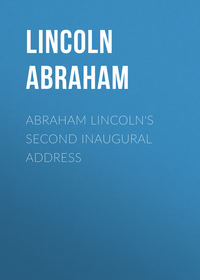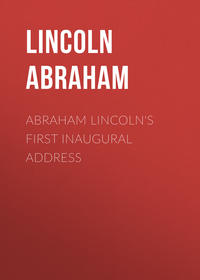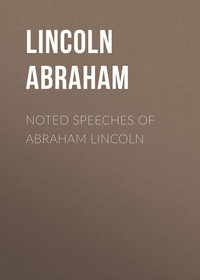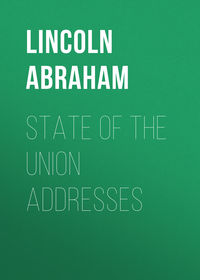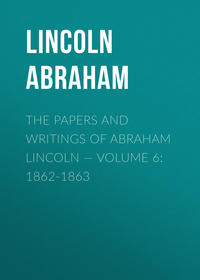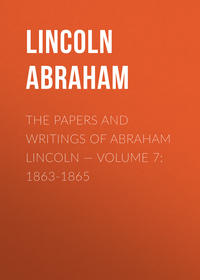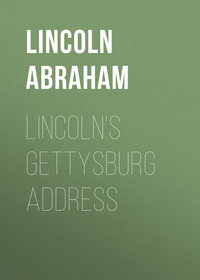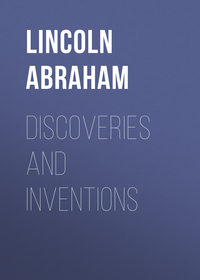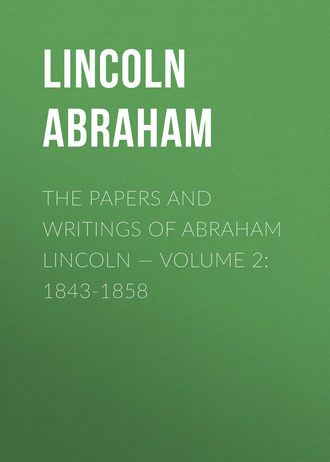 полная версия
полная версияThe Papers And Writings Of Abraham Lincoln — Volume 2: 1843-1858
SPEECH DELIVERED AT WORCESTER, MASS., ON SEPT. 12, 1848
(From the Boston Advertiser.)Mr. Kellogg then introduced to the meeting the Hon. Abram Lincoln, Whig member of Congress from Illinois, a representative of free soil.
Mr. Lincoln has a very tall and thin figure, with an intellectual face, showing a searching mind, and a cool judgment. He spoke in a clear and cool and very eloquent manner, for an hour and a half, carrying the audience with him in his able arguments and brilliant illustrations — only interrupted by warm and frequent applause. He began by expressing a real feeling of modesty in addressing an audience "this side of the mountains," a part of the country where, in the opinion of the people of his section, everybody was supposed to be instructed and wise. But he had devoted his attention to the question of the coming Presidential election, and was not unwilling to exchange with all whom he might the ideas to which he had arrived. He then began to show the fallacy of some of the arguments against Gen. Taylor, making his chief theme the fashionable statement of all those who oppose him ("the old Locofocos as well as the new") that he has no principles, and that the Whig party have abandoned their principles by adopting him as their candidate. He maintained that Gen. Taylor occupied a high and unexceptionable Whig ground, and took for his first instance and proof of this the statement in the Allison letter — with regard to the bank, tariff, rivers and harbors, etc. — that the will of the people should produce its own results, without executive influence. The principle that the people should do what — under the Constitution — as they please, is a Whig principle. All that Gen. Taylor is not only to consent to, but appeal to the people to judge and act for themselves. And this was no new doctrine for Whigs. It was the "platform" on which they had fought all their battles, the resistance of executive influence, and the principle of enabling the people to frame the government according to their will. Gen. Taylor consents to be the candidate, and to assist the people to do what they think to be their duty, and think to be best in their national affairs, but because he don't want to tell what we ought to do, he is accused of having no principles. The Whigs here maintained for years that neither the influence, the duress, or the prohibition of the executive should control the legitimately expressed will of the people; and now that, on that very ground, Gen. Taylor says that he should use the power given him by the people to do, to the best of his judgment, the will of the people, he is accused of want of principle, and of inconsistency in position.
Mr. Lincoln proceeded to examine the absurdity of an attempt to make a platform or creed for a national party, to all parts of which all must consent and agree, when it was clearly the intention and the true philosophy of our government, that in Congress all opinions and principles should be represented, and that when the wisdom of all had been compared and united, the will of the majority should be carried out. On this ground he conceived (and the audience seemed to go with him) that Gen. Taylor held correct, sound republican principles.
Mr. Lincoln then passed to the subject of slavery in the States, saying that the people of Illinois agreed entirely with the people of Massachusetts on this subject, except perhaps that they did not keep so constantly thinking about it. All agreed that slavery was an evil, but that we were not responsible for it and cannot affect it in States of this Union where we do not live. But the question of the extension of slavery to new territories of this country is a part of our responsibility and care, and is under our control. In opposition to this Mr. L. believed that the self-named "Free Soil" party was far behind the Whigs. Both parties opposed the extension. As he understood it the new party had no principle except this opposition. If their platform held any other, it was in such a general way that it was like the pair of pantaloons the Yankee pedlar offered for sale, "large enough for any man, small enough for any boy." They therefore had taken a position calculated to break down their single important declared object. They were working for the election of either Gen. Cass or Gen. Taylor. The speaker then went on to show, clearly and eloquently, the danger of extension of slavery, likely to result from the election of Gen. Cass. To unite with those who annexed the new territory to prevent the extension of slavery in that territory seemed to him to be in the highest degree absurd and ridiculous. Suppose these gentlemen succeed in electing Mr. Van Buren, they had no specific means to prevent the extension of slavery to New Mexico and California, and Gen. Taylor, he confidently believed, would not encourage it, and would not prohibit its restriction. But if Gen. Cass was elected, he felt certain that the plans of farther extension of territory would be encouraged, and those of the extension of slavery would meet no check. The "Free Soil" mart in claiming that name indirectly attempts a deception, by implying that Whigs were not Free Soil men. Declaring that they would "do their duty and leave the consequences to God" merely gave an excuse for taking a course they were not able to maintain by a fair and full argument. To make this declaration did not show what their duty was. If it did we should have no use for judgment, we might as well be made without intellect; and when divine or human law does not clearly point out what is our duty, we have no means of finding out what it is but by using our most intelligent judgment of the consequences. If there were divine law or human law for voting for Martin Van Buren, or if a fair examination of the consequences and just reasoning would show that voting for him would bring about the ends they pretended to wish — then he would give up the argument. But since there was no fixed law on the subject, and since the whole probable result of their action would be an assistance in electing Gen. Cass, he must say that they were behind the Whigs in their advocacy of the freedom of the soil.
Mr. Lincoln proceeded to rally the Buffalo convention for forbearing to say anything — after all the previous declarations of those members who were formerly Whigs — on the subject of the Mexican War, because the Van Burens had been known to have supported it. He declared that of all the parties asking the confidence of the country, this new one had less of principle than any other.
He wondered whether it was still the opinion of these Free Soil gentlemen, as declared in the "whereas" at Buffalo, that the Whig and Democratic parties were both entirely dissolved and absorbed into their own body. Had the Vermont election given them any light? They had calculated on making as great an impression in that State as in any part of the Union, and there their attempts had been wholly ineffectual. Their failure was a greater success than they would find in any other part of the Union.
Mr. Lincoln went on to say that he honestly believed that all those who wished to keep up the character of the Union; who did not believe in enlarging our field, but in keeping our fences where they are and cultivating our present possessions, making it a garden, improving the morals and education of the people, devoting the administrations to this purpose; all real Whigs, friends of good honest government — the race was ours. He had opportunities of hearing from almost every part of the Union from reliable sources and had not heard of a county in which we had not received accessions from other parties. If the true Whigs come forward and join these new friends, they need not have a doubt. We had a candidate whose personal character and principles he had already described, whom he could not eulogize if he would. Gen. Taylor had been constantly, perseveringly, quietly standing up, doing his duty and asking no praise or reward for it. He was and must be just the man to whom the interests, principles, and prosperity of the country might be safely intrusted. He had never failed in anything he had undertaken, although many of his duties had been considered almost impossible.
Mr. Lincoln then went into a terse though rapid review of the origin of the Mexican War and the connection of the administration and General Taylor with it, from which he deduced a strong appeal to the Whigs present to do their duty in the support of General Taylor, and closed with the warmest aspirations for and confidence in a deserved success.
At the close of his truly masterly and convincing speech, the audience gave three enthusiastic cheers for Illinois, and three more for the eloquent Whig member from the State.
HIS FATHER'S REQUEST FOR MONEY
TO THOMAS LINCOLNWASHINGTON, Dec. 24, 1848.
MY DEAR FATHER: — Your letter of the 7th was received night before last. I very cheerfully send you the twenty dollars, which sum you say is necessary to save your land from sale. It is singular that you should have forgotten a judgment against you; and it is more singular that the plaintiff should have let you forget it so long; particularly as I suppose you always had property enough to satisfy a judgment of that amount. Before you pay it, it would be well to be sure you have not paid, or at least, that you cannot prove you have paid it.
Give my love to mother and all the connections. Affectionately your son,
A. LINCOLN.
1849
Resolved, That the Committee on the District of Columbia be instructed to report a bill in substance as follows:
Sec. 1. Be it enacted by the Senate and House of Representatives of the United States, in Congress assembled, That no person not now within the District of Columbia, nor now owned by any person or persons now resident within it, nor hereafter born within it, shall ever be held in slavery within said District.
Sec. 2. That no person now within said District, or now owned by any person or persons now resident within the same, or hereafter born within it, shall ever be held in slavery without the limits of said District: Provided, That officers of the Government of the United States, being citizens of the slaveholding States, coming into said District on public business, and remaining only so long as may be reasonably necessary for that object, may be attended into and out of said District, and while there, by the necessary servants of themselves and their families, without their right to hold such servants in service being thereby impaired.
Sec. 3. That all children born of slave mothers within said District, on or after the first day of January, in the year of our Lord eighteen hundred and fifty, shall be free; but shall be reasonably supported and educated by the respective owners of their mothers, or by their heirs or representatives, and shall owe reasonable service as apprentices to such owners, heirs, or representatives, until they respectively arrive at the age of __ years, when they shall be entirely free; and the municipal authorities of Washington and Georgetown, within their respective jurisdictional limits, are hereby empowered and required to make all suitable and necessary provision for enforcing obedience to this section, on the part of both masters and apprentices.
Sec. 4. That all persons now within this District, lawfully held as slaves, or now owned by any person or persons now resident within said District, shall remain such at the will of their respective owners, their heirs, and legal representatives: Provided, That such owner, or his legal representative, may at any time receive from the Treasury of the United States the full value of his or her slave, of the class in this section mentioned, upon which such slave shall be forthwith and forever free: And provided further, That the President of the United States, the Secretary of State, and the Secretary of the Treasury shall be a board for determining the value of such slaves as their owners may desire to emancipate under this section, and whose duty it shall be to hold a session for the purpose on the first Monday of each calendar month, to receive all applications, and, on satisfactory evidence in each case that the person presented for valuation is a slave, and of the class in this section mentioned, and is owned by the applicant, shall value such slave at his or her full cash value, and give to the applicant an order on the Treasury for the amount, and also to such slave a certificate of freedom.
Sec. 5. That the municipal authorities of Washington and Georgetown, within their respective jurisdictional limits, are hereby empowered and required to provide active and efficient means to arrest and deliver up to their owners all fugitive slaves escaping into said District.
Sec. 6. That the election officers within said District of Columbia are hereby empowered and required to open polls, at all the usual places of holding elections, on the first Monday of April next, and receive the vote of every free white male citizen above the age of twenty-one years, having resided within said District for the period of one year or more next preceding the time of such voting for or against this act, to proceed in taking said votes, in all respects not herein specified, as at elections under the municipal laws, and with as little delay as possible to transmit correct statements of the votes so cast to the President of the United States; and it shall be the duty of the President to canvass said votes immediately, and if a majority of them be found to be for this act, to forthwith issue his proclamation giving notice of the fact; and this act shall only be in full force and effect on and after the day of such proclamation.
Sec. 7. That involuntary servitude for the punishment of crime, whereof the party shall have been duly convicted, shall in no wise be prohibited by this act.
Sec. 8. That for all the purposes of this act, the jurisdictional limits of Washington are extended to all parts of the District of Columbia not now included within the present limits of Georgetown.
BILL GRANTING LANDS TO THE STATES TO MAKE RAILWAYS AND CANALS
REMARKS IN THE HOUSE OF REPRESENTATIVES, FEBRUARY 13, 1849Mr. Lincoln said he had not risen for the purpose of making a speech, but only for the purpose of meeting some of the objections to the bill. If he understood those objections, the first was that if the bill were to become a law, it would be used to lock large portions of the public lands from sale, without at last effecting the ostensible object of the bill — the construction of railroads in the new States; and secondly, that Congress would be forced to the abandonment of large portions of the public lands to the States for which they might be reserved, without their paying for them. This he understood to be the substance of the objections of the gentleman from Ohio to the passage of the bill.
If he could get the attention of the House for a few minutes, he would ask gentlemen to tell us what motive could induce any State Legislature, or individual, or company of individuals, of the new States, to expend money in surveying roads which they might know they could not make.
(A voice: They are not required to make the road.)
Mr. Lincoln continued: That was not the case he was making. What motive would tempt any set of men to go into an extensive survey of a railroad which they did not intend to make? What good would it do? Did men act without motive? Did business men commonly go into an expenditure of money which could be of no account to them? He generally found that men who have money were disposed to hold on to it, unless they could see something to be made by its investment. He could not see what motive of advantage to the new States could be subserved by merely keeping the public lands out of market, and preventing their settlement. As far as he could see, the new States were wholly without any motive to do such a thing. This, then, he took to be a good answer to the first objection.
In relation to the fact assumed, that after a while, the new States having got hold of the public lands to a certain extent, they would turn round and compel Congress to relinquish all claim to them, he had a word to say, by way of recurring to the history of the past. When was the time to come (he asked) when the States in which the public lands were situated would compose a majority of the representation in Congress, or anything like it? A majority of Representatives would very soon reside west of the mountains, he admitted; but would they all come from States in which the public lands were situated? They certainly would not; for, as these Western States grew strong in Congress, the public lands passed away from them, and they got on the other side of the question; and the gentleman from Ohio [Mr. Vinton] was an example attesting that fact.
Mr. Vinton interrupted here to say that he had stood on this question just where he was now, for five and twenty years.
Mr. Lincoln was not making an argument for the purpose of convicting the gentleman of any impropriety at all. He was speaking of a fact in history, of which his State was an example. He was referring to a plain principle in the nature of things. The State of Ohio had now grown to be a giant. She had a large delegation on that floor; but was she now in favor of granting lands to the new States, as she used to be? The New England States, New York, and the Old Thirteen were all rather quiet upon the subject; and it was seen just now that a member from one of the new States was the first man to rise up in opposition. And such would be with the history of this question for the future. There never would come a time when the people residing in the States embracing the public lands would have the entire control of this subject; and so it was a matter of certainty that Congress would never do more in this respect than what would be dictated by a just liberality. The apprehension, therefore, that the public lands were in danger of being wrested from the General Government by the strength of the delegation in Congress from the new States, was utterly futile. There never could be such a thing. If we take these lands (said he) it will not be without your consent. We can never outnumber you. The result is that all fear of the new States turning against the right of Congress to the public domain must be effectually quelled, as those who are opposed to that interest must always hold a vast majority here, and they will never surrender the whole or any part of the public lands unless they themselves choose to do so. That was all he desired to say.
ON FEDERAL POLITICAL APPOINTMENTS
TO THE SECRETARY OF THE TREASURYWASHINGTON, March 9, 1849.
HON. SECRETARY OF THE TREASURY.
DEAR SIR: Colonel R. D. Baker and myself are the only Whig members of Congress from Illinois of the Thirtieth, and he of the Thirty-first. We have reason to think the Whigs of that State hold us responsible, to some extent, for the appointments which may be made of our citizens. We do not know you personally, and our efforts to you have so far been unavailing. I therefore hope I am not obtrusive in saying in this way, for him and myself, that when a citizen of Illinois is to be appointed in your department, to an office either in or out of the State, we most respectfully ask to be heard.
Your obedient servant,
A. LINCOLN.
MORE POLITICAL PATRONAGE REQUESTS
TO THE SECRETARY OF STATEWASHINGTON, March 10, 1849.
HON. SECRETARY OF STATE.
SIR: — There are several applicants for the office of United States Marshal for the District of Illinois. Among the most prominent of them are Benjamin Bond, Esq., of Carlyle, and Thomas, Esq., of Galena. Mr. Bond I know to be personally every way worthy of the office; and he is very numerously and most respectably recommended. His papers I send to you; and I solicit for his claims a full and fair consideration.
Having said this much, I add that in my individual judgment the appointment of Mr. Thomas would be the better.
Your obedient servant,
A. LINCOLN.
(Indorsed on Mr. Bond's papers.)
In this and the accompanying envelope are the recommendations of about two hundred good citizens of all parts of Illinois, that Benjamin Bond be appointed marshal for that district. They include the names of nearly all our Whigs who now are, or have ever been, members of the State Legislature, besides forty-six of the Democratic members of the present Legislature, and many other good citizens. I add that from personal knowledge I consider Mr. Bond every way worthy of the office, and qualified to fill it. Holding the individual opinion that the appointment of a different gentleman would be better, I ask especial attention and consideration for his claims, and for the opinions expressed in his favor by those over whom I can claim no superiority.
A. LINCOLN.
TO THE SECRETARY OF THE INTERIOR
SPRINGFIELD, ILLINOIS, April 7, 1849HON. SECRETARY OF THE HOME DEPARTMENT.
DEAR SIR: — I recommend that Walter Davis be appointed receiver of the land-office at this place, whenever there shall be a vacancy. I cannot say that Mr. Herndon, the present incumbent, has failed in the proper discharge of any of the duties of the office. He is a very warm partisan, and openly and actively opposed to the election of General Taylor. I also understand that since General Taylor's election he has received a reappointment from Mr. Polk, his old commission not having expired. Whether this is true the records of the department will show. I may add that the Whigs here almost universally desire his removal.
I give no opinion of my own, but state the facts, and express the hope that the department will act in this as in all other cases on some proper general rule.
Your obedient servant,
A. LINCOLN.
P. S. — The land district to which this office belongs is very nearly if not entirely within my district; so that Colonel Baker, the other Whig representative, claims no voice in the appointment. A. L.
TO THE SECRETARY OF THE INTERIOR
SPRINGFIELD, ILLINOIS, April 7, 1849HON. SECRETARY OF THE HOME DEPARTMENT.
DEAR SIR: — I recommend that Turner R. King, now of Pekin, Illinois, be appointed register of the land-office at this place whenever there shall be a vacancy.
I do not know that Mr. Barret, the present incumbent, has failed in the proper discharge of any of his duties in the office. He is a decided partisan, and openly and actively opposed the election of General Taylor. I understand, too, that since the election of General Taylor, Mr. Barret has received a reappointment from Mr. Polk, his old commission not having expired. Whether this be true, the records of the department will show.
Whether he should be removed I give no opinion, but merely express the wish that the department may act upon some proper general rule, and that Mr. Barret's case may not be made an exception to it.
Your obedient servant,
A. LINCOLN.
P. S. — The land district to which this office belongs is very nearly if not entirely within my district; so that Colonel Baker, the other Whig representative, claims no voice in the appointment. A. L.
TO THE POSTMASTER-GENERAL
SPRINGFIELD, ILLINOIS, April 7,1849HON. POSTMASTER-GENERAL.
DEAR Sir: — I recommend that Abner Y. Ellis be appointed postmaster at this place, whenever there shall be a vacancy. J. R. Diller, the present incumbent, I cannot say has failed in the proper discharge of any of the duties of the office. He, however, has been an active partisan in opposition to us.


